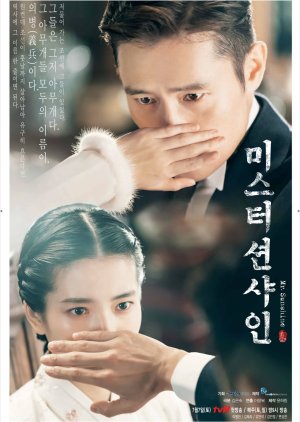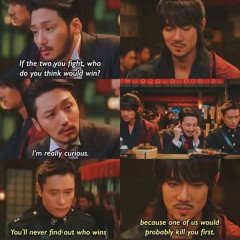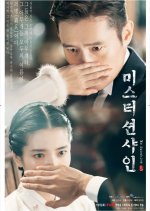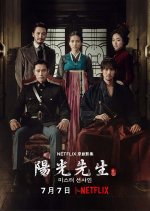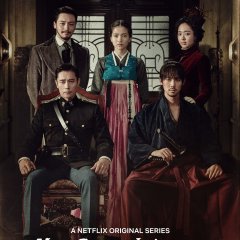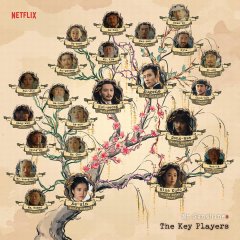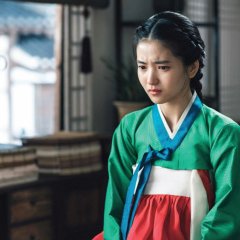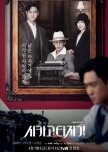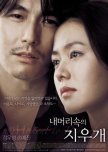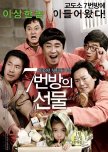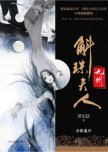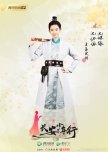 "I kept getting rejected from auditions": "Queen of Tears" Lee Joo Bin Talks About Her Past Struggle
"I kept getting rejected from auditions": "Queen of Tears" Lee Joo Bin Talks About Her Past Struggle Mr. Sunshine raconte l'histoire d'un jeune garçon, Choi Yu-jin, né esclave dans une famille riche de Joseon qui parvient à s'embarquer pour les Etats-Unis pendant l'expédition américaine en Corée de 1871. Des années plus tard, il revient sur sa terre natale en tant qu'officier américain de l'US Marine du nom de Eugene Choi. Il y rencontre Go Ae Shin, la fille d'un aristocrate, et en tombe amoureux. Pendant son stationnement en Corée, il découvre un complot mené par des forces étrangères afin de coloniser la Corée. Modifier la traduction
- Français
- 한국어
- 中文(简体)
- 中文(台灣)
- Titre original: 미스터 션샤인
- Aussi connu sous le nom de: Miseuteo Shunshain , Mister Sunshine
- Scénariste: Kim Eun Sook
- Réalisateur: Lee Eung Bok, Jang Young Woo
- Genres: Militaire, Historique, Romance, Mélodrame
Où regarder Mr. Sunshine
Subscription (sub)
Distribution et équipes
- Lee Byung Hun Rôle principal
- Kim Tae Ri Rôle principal
- Yoo Yeon Seok Rôle principal
- Kim Min Jung Rôle principal
- Byun Yo Han Rôle principal
- Kim Gab SooHwang Eun SanRôle Secondaire
Critiques

Enjoy little things
2 personnes ont trouvé cette critique utile
Cette critique peut contenir des spoilers
Un drama plein d'émotions
Et bien, il y a 3 ans, c'était mon premier drama... Et celui qui m'a fait devenir accroc au Kdrama, entre autre.Il faut dire, il est magnifique ! Historique, les costumes et les paysages sont sublimes. Les acteurs sont magnifiques, et les rôles secondaires sont tout aussi captivant que le duo principal.
Les émotions sont fortes, sans jamais échanger un seul baiser dans tout le drama, les deux acteurs principaux arrivent à nous faire vivre une des plus belles histoires d'amour de tout les temps.
Par contre préparez la boite de mouchoir, c'est aussi un des dramas les plus tristes que j'ai eu à voir.
Enfin, la touche finale de cette série, et pas des moindres : Les musiques. Elles sont juste magnifiques, et on ne se lasse pas de réécouter toute la bande son en boucle, même une fois le drama fini.
Bref, un bijou à découvrir.
Cet avis était-il utile?
Cette critique peut contenir des spoilers
Beautiful but ultimately hollow symbolism
I have finished watching MR SUNSHINE, and there was so much that I loved about this prestige kdrama. The writing of the heroine was SO good in how it discussed and defied some of the worse kdrama-heroine tropes. There was amazingly trenchant and deeply nuanced social criticism, gorgeous cinematography, lots of fascinating history, the warmest and most positive depiction of Christianity I've ever seen in a kdrama, men who drink respect women juice, the beautiful and angsty Gu Dong-Mae, FABULOUS period clothing, and rivals in love learning to put aside their differences in favour of shooting imperialists.But the show has a major flaw - a flaw that was particularly interesting to me, because it's the precise sort of flaw that I would be most prone to. The screenwriter, who does such brilliant work in so many other ways, is clearly most fascinated by the themes and symbolism she keeps bubbling away in the story's subtext. The problem is that these themes and symbolism - which delightfully clever - are not actually supported by the storytelling, and particularly by the characterisation.
And it's a really fun, rich, resonant bit of symbolism: Ae-Sin is not just a character in the story, she's the living embodiment of Joseon Korea. She's beautiful, desirable, noble, privileged, gradually awakening to a life of hardship and struggle and resistance. Each of the three male leads in the story has a different complicated relationship with her. Eugene has run away from Korea, but returning as an adult cannot help falling in love with the land and the people in defiance of the nobility who mistreated him as a boy. Gu Dong-mae was horribly oppressed by his homeland but cannot help loving it anyway; the Korea which oppressed both men also saved their lives through small acts of kindness. And finally, Hee-Sung, Korea's richest son, is her approved betrothed, but past injustices committed by his family against the people Ae-Sin cares about stand between them. The three men fall in love, not with Ae-Sin, but with their homeland. They express their love for the woman by sacrificing themselves for the homeland; in dedicating themselves to her, they cannot help dedicating themselves to the fight for freedom.
This is why the story had to have a sad ending. None of these men can espouse the whole country; they can only die for her, while Ae-Sin - Korea itself - lives on, alone and victorious, even in exile.
This symbolism is itself delightfully rich, deftly painted, and rewarding to think back upon once you see it. There's only one problem: it doesn't. make. sense.
From the very start of the show, I felt a little impatient with the writing because the relationships between the heroine and her three suitors are so poorly developed. The feelings come out of nowhere. Take Gu Dong-Mae, for instance: he last met this woman when she saved his life as children. Now, it just takes a brush of her dress across his fingers to get him pining madly for her. Hee-Sung, after avoiding her for the best part of a decade, gets one glimpse of Ae-Sin at the washing-line and just like that conceives an undying passion for her. The central relationship, between Ae-Sin and Eugene, doesn't fare much better. The problem is that the story demands each of the male leads to sacrifice himself for Ae-Sin by the end of the show, and I simply couldn't understand why they should. They all have multiple other women pining for them, and Ae-Sin doesn't give two of them the slightest encouragement to hope. I wanted them so badly to find happiness with one of the other women, and they never did.
What MR SUNSHINE needed was not primarily rich and complex symbolism - it was believable characterisation and relationship development. As it was, the lack of substance to the relationships cheapened the grand historical tragedy which was being told. When at the climactic moment the last of the three leads sacrifices himself for the heroine, it felt cheesy and unintentionally funny, rather than tragic.
I loved so much about this story, but the heart of it never clicked for me, and it's a crying shame that with all that budget and talent, it wasn't better written. And that, for me, will be the central tragedy of MR SUNSHINE.
Cet avis était-il utile?

